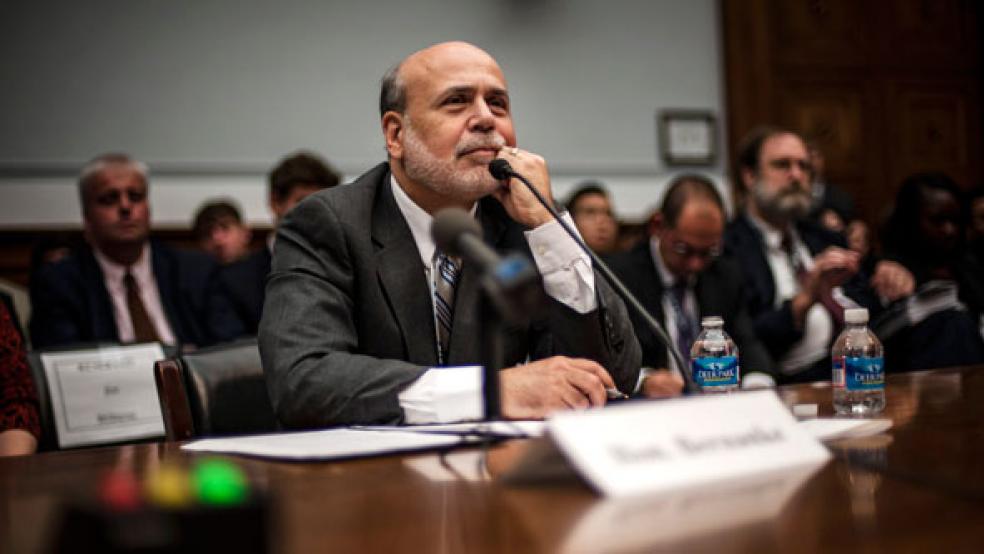Home prices are putting Federal Reserve Chairman Ben Bernanke into a political vice.
An improving real estate market has propelled the economy forward, enough that Bernanke has been laying the groundwork to ease up on the Fed’s $85 billion-a-month bond purchasing program. Stock market volatility has surged on fears that the economy will collapse without this crutch being provided by the Fed.
House Financial Services Committee Chairman Jeb Hensarling (R-TX) suggested at a Wednesday hearing with Bernanke that a basic problem with the economy has been Bernanke’s ability to influence investors with his words.
“The markets’ recent extreme volatility resulting from the offhanded comments of one individual, our witness today, is not healthy for an economy,” Hensarling said.
RELATED: WHY BERNANKE CAN STOP BEING OUR DESIGNATED DRIVER
But this phenomenon predates Bernanke. The markets have registered their content, fury, and confusion over the actions of past Fed chairmen such as Alan Greenspan and Paul Volcker.
In fact, the anxiety at the moment—shaping policy—is whether the housing rebound has started to sputter. If Bernanke is anything, he is an economist who prizes good data.
Bernanke has equated his current task to knowing when to ease off the gas pedal, a metaphor that should be matched by the understanding that there are dangerous curves ahead.
The Fed chairman first explained last month that bond purchases could possibly wind down when the 7.6 unemployment rate falls to 7 percent. Much of this tapering should occur when Bernanke—as expected—leaves office next year.
At the time, home prices had surged by double digits over the past 12 months in many cities.
But 90 minutes before Bernanke sat down before the committee, the Commerce Department reported that housing starts plummeted by 9.9 percent last month. New permits fell as well, possible evidence that real estate has started to cool as an investment.
This matters a lot.
Because the Fed is a spigot controlling the flow of money in the economy, its policies have an outsized impact on two industries--auto and home sales. These are, incidentally, the two areas that are “leading our recovery,” Bernanke told the committee.
“Housing prices going up are not only beneficial in stimulating more construction, but they improve the balance sheets of households” that increase consumer spending, Bernanke said.
RELATED: THE FIVE PEOPLE WHO COULD SUCCEED BERNANKE
The dilemma is that mortgage rates have increased as Bernanke has hinted at the timeline for ending the Fed’s bond-buying program. As the rates increase, homes become less affordable and the recovery must depend on other factors to be sustained.
Interest rates on 30-year mortgages have jumped over the past three months from 3.41 percent to 4.51 percent. Bernanke told the committee that he is monitoring the situation.
“Housing is actually off significantly,” Harvard University economist Martin Feldstein told CNBC as the hearing started. “It’s going to be very hard for them to say that the economy is strong and therefore tapering is called for.”
At the same time, House Republicans are looking to overhaul the entire mortgage sector. Hensarling is eager to end government guarantees for mortgages, wind down the two housing finance companies under federal conservatorship (Fannie Mae and Freddie Mac), and potentially eliminate the 30-year fixed rate mortgage.
That proposal has little chance of gaining support from Democrats, but it was the obsession du jour as lawmakers asked questions designed to get Bernanke’s opinion ahead of hearings the committee will hold Thursday on the measure.
A sweeping reform of the mortgage sector would further complicate the Fed’s calculus to return to a normal monetary policy.
Bernanke never took the bait being dangled by lawmakers about which mortgage reforms would be best. His only suggestion was that if the government does provide a backstop, it should collect an insurance premium so that taxpayers aren’t stuck with the cost of a bailout along the lines of what happened in 2008.
Perhaps the most unintentionally revealing moment about the housing market came from a question by Rep. Bill Huizenga (R-MI), who asked whether his friend should refinance his mortgage now.
Bernanke, humbly, declined to answer.
“I’m not a qualified financial adviser,” he said.




